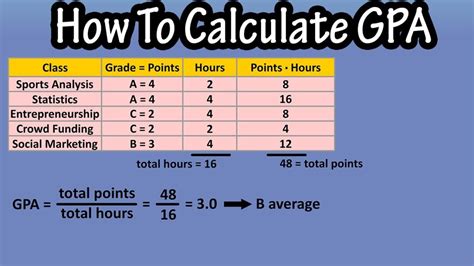Introduction
Grade point average (GPA) is a numerical representation of a student’s academic performance. It is calculated by dividing the total number of grade points earned by the total number of credits attempted. GPA is used by colleges, universities, and employers to assess a student’s academic achievement.

Calculating Your GPA
To calculate your GPA, follow these steps:
- Gather your transcripts. Your transcripts will show your grades for all of your coursework.
- Convert your grades to grade points. Each grade has a corresponding grade point value. For example, an A is worth 4.0 grade points, a B is worth 3.0 grade points, and so on.
- Multiply your grade points by the number of credits for each course. For example, if you earned an A in a 3-credit course, you would earn 12 grade points (4.0 x 3).
- Add up all of your grade points.
- Add up all of the credits you have attempted.
- Divide your total grade points by your total credits attempted. This will give you your GPA.
Example
Let’s say you have taken the following courses:
- English 101: A (4.0 grade points, 3 credits)
- Math 101: B (3.0 grade points, 3 credits)
- History 101: C (2.0 grade points, 3 credits)
- Science 101: D (1.0 grade point, 3 credits)
To calculate your GPA, you would:
- Multiply your grade points by the number of credits for each course:
- English 101: 4.0 x 3 = 12 grade points
- Math 101: 3.0 x 3 = 9 grade points
- History 101: 2.0 x 3 = 6 grade points
- Science 101: 1.0 x 3 = 3 grade points
- Add up all of your grade points: 12 + 9 + 6 + 3 = 30 grade points
- Add up all of the credits you have attempted: 3 + 3 + 3 + 3 = 12 credits
- Divide your total grade points by your total credits attempted: 30 / 12 = 2.5
Your GPA would be 2.5.
Factors that Affect Your GPA
Several factors can affect your GPA, including:
- The difficulty of your coursework. Courses that are more challenging will typically have higher grade point values.
- Your study habits. Students who study hard and do their homework tend to have higher GPAs.
- Your attendance. Students who attend class regularly tend to have higher GPAs.
- Your extracurricular activities. Students who participate in extracurricular activities may have less time to study, which can lead to a lower GPA.
Improving Your GPA
If you are unhappy with your GPA, there are several things you can do to improve it:
- Take easier courses. If you are struggling in a particular course, consider dropping it or taking a less challenging course.
- Study harder. Make sure you are spending enough time studying and doing your homework.
- Attend class regularly. Attending class regularly will help you keep up with the material and avoid falling behind.
- Get help from a tutor or counselor. If you are struggling in a particular course, consider getting help from a tutor or counselor.
- Reduce your extracurricular activities. If you are spending too much time on extracurricular activities, consider reducing your involvement in some of them.
Conclusion
GPA is an important measure of a student’s academic achievement. By understanding how to calculate your GPA and the factors that affect it, you can take steps to improve your GPA and reach your academic goals.
Frequently Asked Questions
1. What is a good GPA?
A good GPA is typically considered to be 3.5 or higher. However, the definition of a “good” GPA can vary depending on the school or employer you are applying to.
2. How can I improve my GPA quickly?
There is no quick and easy way to improve your GPA. However, you can take steps to gradually improve your GPA over time by studying hard, attending class regularly, and getting help from a tutor or counselor if needed.
3. Does my GPA matter after college?
Your GPA may matter after college if you are applying to graduate school or a professional school. However, it is important to note that your GPA is just one factor that admissions committees will consider.
4. What is the difference between GPA and class rank?
GPA is a measure of your academic achievement, while class rank is a measure of your standing in relation to your classmates. Class rank is typically calculated by comparing your GPA to the GPAs of all other students in your class.
